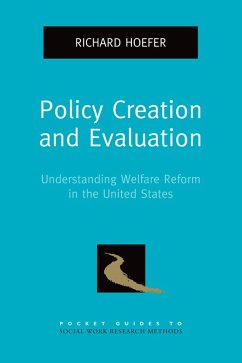
Fostering Accountability (eBook, PDF)
Using Evidence to Guide and Improve Child Welfare Policy
Redaktion: Testa, Mark F.; Poertner, John
Versandkostenfrei!
Sofort per Download lieferbar
25,95 €
inkl. MwSt.
Weitere Ausgaben:

PAYBACK Punkte
13 °P sammeln!
Fostering Accountability presents a model of child welfare decision making that holds public officials answerable for the integrity and validity of the actions they take on behalf of the children and families in their care. It operationalizes the concept of results-oriented accountability, which demands that administrators and practitioners show valid evidence of their success in improving child and family outcomes, not merely demonstrate mechanical procedural compliance. Drawing on the experiences of directors, staff, and evaluators, this timely and practical book describes the emergence of r...
Fostering Accountability presents a model of child welfare decision making that holds public officials answerable for the integrity and validity of the actions they take on behalf of the children and families in their care. It operationalizes the concept of results-oriented accountability, which demands that administrators and practitioners show valid evidence of their success in improving child and family outcomes, not merely demonstrate mechanical procedural compliance. Drawing on the experiences of directors, staff, and evaluators, this timely and practical book describes the emergence of results-oriented accountability in child welfare with a special focus on the editors' role in establishing a university-agency research partnership under a federal consent decree. Chapters elaborate on the five successive stages of the results-oriented accountability framework-outcomes monitoring, data analysis, research review, evaluation, and quality improvement-and provide examples of applications of each stage for agency managers. By refocusing the emphasis on developing policies based on agency data, instead of purely reactive approaches that grasp at solutions and often fall short, Fostering Accountability guides administrators in monitoring outcomes, using evidence to select interventions to enhance results, and applying management strategies to evaluate and improve these efforts. The result is a pragmatic implementation guide for administrators seeking to bring safety, stability, continuity, permanence, and well-being to the lives of abused and neglected children in the United States.
Dieser Download kann aus rechtlichen Gründen nur mit Rechnungsadresse in A, B, BG, CY, CZ, D, DK, EW, E, FIN, F, GR, HR, H, IRL, I, LT, L, LR, M, NL, PL, P, R, S, SLO, SK ausgeliefert werden.













